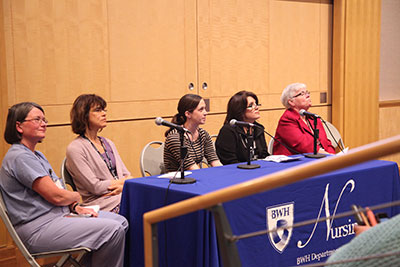State of Department Focuses on Pursuit of Magnet Designation
 |
From left: Diane Miller, Mary Pennington, Katie Fillipon, Suzanne Fernandes and Kathleen Gallivan |
During the annual State of the Department of Nursing address in May, Chief Nursing Officer and Senior Vice President of Patient Care Services Jackie Somerville, PhD, RN, emphasized one of the department's ongoing priorities: to create a practice environment in which all patients and families receive excellent care and all staff feel supported in their professional development in order to provide excellent care.
"There is a clear case as to why organizations should invest in a professional practice environment-it translates to better patient outcomes," Somerville said.
The next step in achieving that goal is to learn what excellent care to patients and families looks like outside of the walls of BWH. Thus, the Department of Nursing has officially launched its journey to pursue Magnet Recognition-a four-year certification developed by the American Nurses Credentialing Center (ANCC) to recognize health care organizations for quality patient care, nursing excellence and innovations in professional nursing practice.
"Magnet is not just a designation to hang on our doorway," Somerville said. "It truly is a journey to better patient outcomes."
In the 33 years since Magnet was developed, research has shown that hospitals with Magnet certification have improved patient safety outcomes compared to non-Magnet hospitals, including:
- A reduction in fall rates of up to 10.3 percent
- Significantly lower risk-adjusted rate of seven-day mortality and two major morbidities-nosocomial infection and severe intraventricular hemorrhage-among very low birth weight infants
- Lower decubitus ulcer rates among adult medical surgical patients
A panel of nurses and Chaplaincy director Kathleen Gallivan, PhD, spoke about their experience in learning more about Magnet at a recent conference. The question that Somerville and each of the panelists ruminated on was, ‘Why not us?'
"There was nothing that nurses from Magnet hospitals said or did at the sessions that we aren't doing already at the Brigham," said Diane Miller, MPH, BSN, RN, Tower 11C nurse-in-charge. "They just articulated it in a different way."
Mary Pennington, MS, RN, program director of the Center for Nursing Excellence, said one of her takeaways from the conference was that nurses at Magnet organizations spoke so positively of the journey to achieving designation. "It brings nurses together around patient care and nursing practice," she said.
Panelists agreed that BWH nurses are already doing the work and meeting much of the criteria that Magnet requires. "Our interprofessional relationships are strong, our staff feel empowered to bring issues forward and we have great organizational support for nursing," said Hematology/Oncology Nursing Director Katie Fillipon, MS, RN, OCN, FNP.
Suzanne Fernandes, BSN, RN, of the Float Pool, said that the department's six nursing committees, plus the unit-based practice councils, exemplify the strong support for nursing and the ways that nurses' voices are heard throughout the organization.
One important component that Somerville emphasized is that Magnet isn't simply about nursing, which is why Gallivan joined the conference and panel discussion. "At the conference, I found many chaplains, social workers and others who weren't nurses but reinforced how much of an interprofessional journey this process is," she said. "Even though I'm not a nurse, I felt great enthusiasm and excitement at the conference for the journey ahead of us."
To achieve Magnet designation, BWH must complete an application with written documentation addressing 49 criteria. Appraisers will review and score the documentation and follow up with a site visit to BWH in order to validate the written documentation and decide if BWH has earned certification.
Stay tuned for more information on this exciting journey!